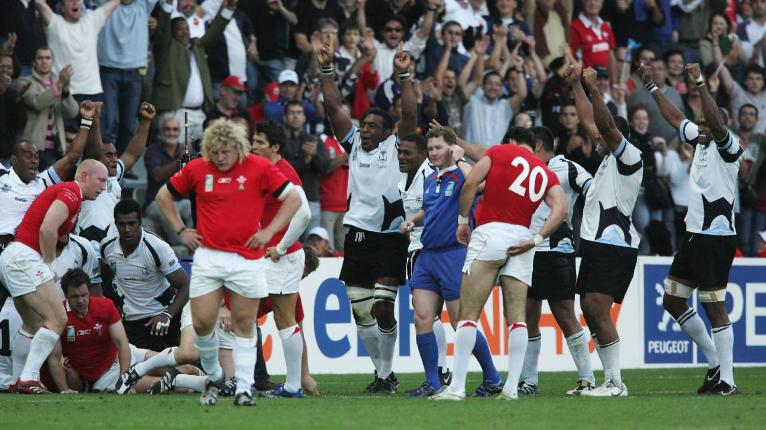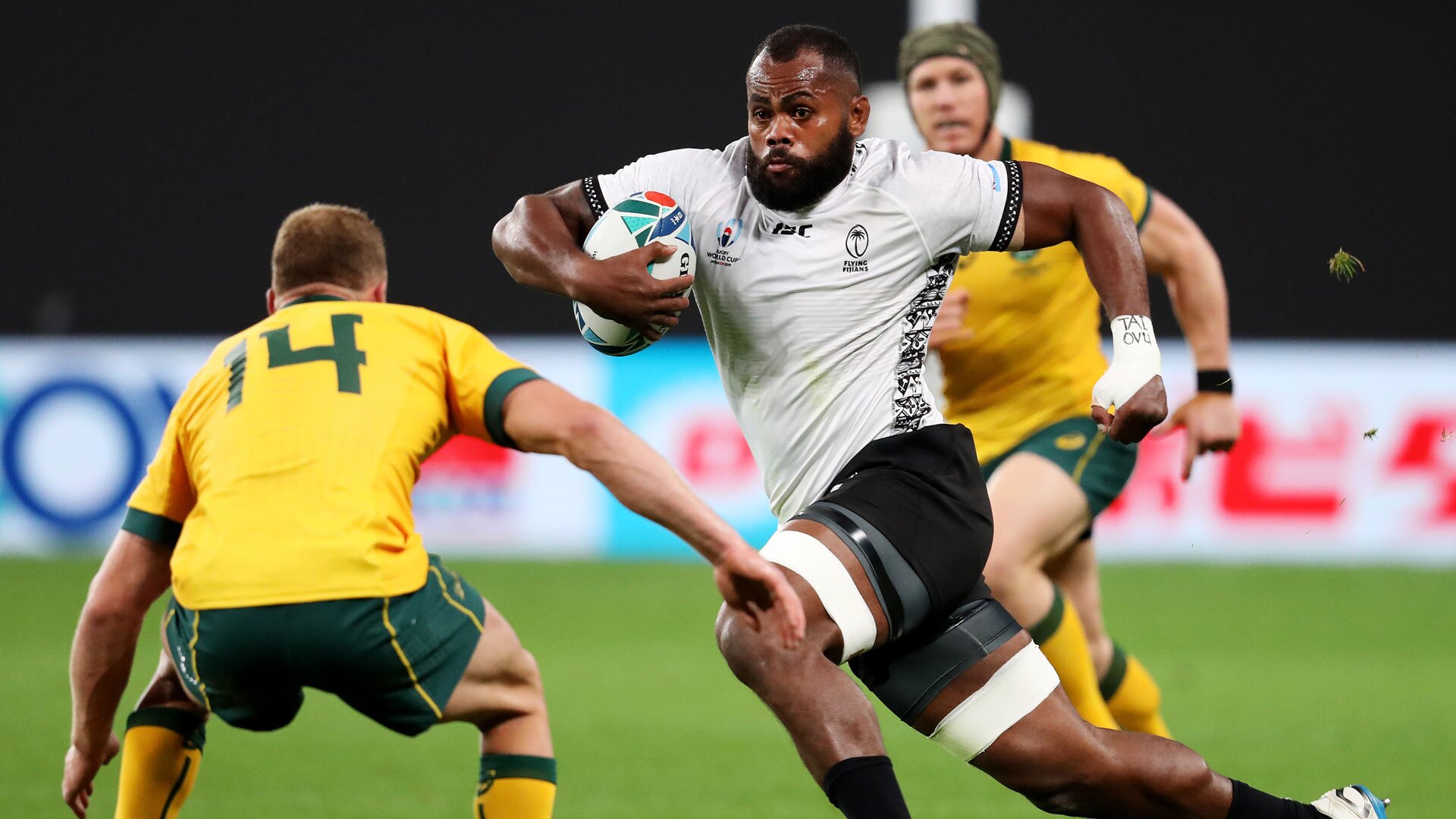Laws of the game go out the window in opening days of Rugby World Cup

It’s been arguably two of the best opening days of a World Cup in the history of the competition, with a victory for the hosts as well as three intensely-fought matches.
So, what have we learned so far?
Pieter-Steph du Toit is the front runner for the Player of the Year
It’s been a monstrous year to date for Springboks tackling machine Pieter-Steph du Toit. Du Toit started out his professional career as a lock and has all the aerial skills needed to compete with the best second rowers in the world, but his mobility around the field is also exceptional.
https://www.instagram.com/p/B2rM71-ox9b/
Du Toit topped the tackle charts against the All Blacks on Saturday night but was also regularly on hand to truck up the ball when called upon. He also scored a crucial try for the Springboks. The blindside flanker is arguably the best in the world at his trade right now – especially when it comes to the core roles – and it will take a monumental effort from someone else to grapple World Rugby’s Player of the Year award away from the loose forward.
Rieko Ioane isn’t going to feature in the knockout stages of the tournament
Perhaps not a hot take anymore, given his fall from grace, but going into the World Cup there was still a chance that All Blacks wing Rieko Ioane could nab back his spot from George Bridge.
Continued below…
That looks almost impossible now, with Bridge performing well against the Springboks on Saturday night and making the most of his chances.
After the Crusaders outside back was handed the 11 jersey against the Wallabies for the last Bledisloe Cup match of the year, the left wing berth became Bridge’s to lose. Two good performances against top sides now means that Ioane’s only opportunities to present his case will come against minnows like Namibia and Canada.
Even if Ioane comes alive against the tier-2 and 3 sides, that won’t be enough to usurp Bridge, who will likely turn out against Italy.
Japan are going to struggle against teams that can hold onto the ball
The Brave Blossoms have adopted an absolutely frenetic style of play in recent times.
Cuts left, right and centre will have plenty of teams flummoxed – including the Pacific Island sides that Japan outplayed during the Pacific Nations Cup – but it’s not going to work against Scotland and Wales, who have far tighter defences camped out around the breakdowns.
Their high-speed play ironically also didn’t pay dividends against Russia on Friday night – but you get the sense that was because Russia didn’t fan out too far from the ruck due to their lack of fitness. Had Japan spread the ball to the wings they liked would have prospered.
High tackle laws? What high tackle laws?
In the first two matches of the competition, Japan v Russia and Australia v Fiji, one player should have been sent off in each game for high tackles.
Russian scrumhalf Vasily Dorofeev copped a shoulder to the chin from Brave Blossom locks James Moore part-way through their opening fixture of the competition. Under the current laws, a shoulder to the head without any mitigating factors is an instant red card.
Looks like the officials missed a potential red card. Imagine what that would have meant in this match. #JAPvRUS pic.twitter.com/cIw7Bass1G
— Jacques Burger (@Nabasboer) September 20, 2019
In Saturday’s game between Fiji and Australia, a similar situation occurred early in the match, with Wallabies wing Reece Hodge turning his shoulder to brace against rampaging Fijian flanker Peceli Yato. Yato had to leave the field for an HIA and never returned – yet Hodge received no sanction.
https://twitter.com/Scienceofsport/status/1175287794643668992
Japan and Australia were the victors in those matches, who could know how the games would have changed if the winners were down to 14 men?
There’s a 36-hour window after a game in which a player can be cited, which means that James Moore escaped sanction. Who knows whether Hodge will be punished? Even if the players were punished after the match, that will be of no consolation to the losing sides.
Offside line? What offside line?
The offside line is rarely policed anymore.
There were multiple instances in all four games played so far where defences crept up to nail ball carriers as soon as they had hands on the pill.
When Picamoles intercepted Argentina…not offside says Angus Gardner 🤔
Huge moment #FRAvARG #RWC2019 pic.twitter.com/XHebI6pP5Y
— Tim Cocker (@cocker) September 21, 2019
The lack of running opportunities for attacking teams have fallen in recent teams. Supposedly this is because of the line speed that teams on defence are adopting; the rush defence is hugely common now.
In reality, however, the rush defence is only work so efficiently because teams are regularly half a metre offside and can shut down attacking sides with ease.
This is becoming especially common on the goal line. If one team is camped out trying to prevent the ball carrier from crashing over for a try then you can be sure that almost the entire defensive line will be offside.
If we have viewers new to the game of Rugby for this World Cup – please don’t concern yourself about tying to grasp laws around the breakdown. One less thing to worry about. They don’t exist. Offside line soon to follow suite to help you even more. You’re welcome.
— Ben Ryan (@benjaminryan) September 21, 2019
The defending team have to all be behind the back foot of the hindmost player at the ruck. That’s certainly not been the case at the World Cup so far.
Extending rucks is against the spirit of the game
One of the most frustrating things to watch in rugby right now is when players ‘bind’ onto the ruck so as to give the halfback more time and space to get away a box kick. We’re now seeing rucks extending three or four metres from one team’s side to the other’s.
It happens ruck after ruck, game after game, and it’s completely against the spirit of the breakdown.
According to the World Rugby laws, “the purpose of a ruck is to allow players to compete for the ball which is on the ground.”
Rucks are now being used as shields to ensure that box kicks can’t be charged down, which completely goes against their purpose. If players are joining onto the ruck with no intent to help secure the ball then referees should be sending them away.
Fiji will push Wales all the way
The Flying Fijians sure are a sight to behold.
Perhaps they lacked some of the technical skills to compete with the best of the best, but their athleticism, power and speed will make mincemeat of the Uruguayans when they face off later this week.
They’ll also do very well against Wales – especially if the Red Dragons are off their game.

There are a few areas of improvement for Fiji, namely in the scrums, but they will feast on any ball that Wales gift them with.
When Wales and Fiji face off on October 9th, Wales will have already played Australia. If they win that match then there’s a very good chance they’ll make the quarterfinals, but if they don’t manage to get the victory against the Wallabies then the game with Fiji could have major repercussions.
France and Argentina live for the World Cup – but probably won’t scare England
It may be a huge cliché, but there’s no better way to describe France and Argentina’s fixture than a game of two halves.
France rushed out to a handy 20-3 advantage at halftime, then Argentina clawed their way back to take the lead 21-20.
Had Argentina won, it would’ve been the biggest comeback in World Cup history.
Regardless of the result, there was plenty of endeavor from both sides. The two nations have, at times, been some of the best sides to watch in world rugby but they’ve both underperformed in recent times.
We already knew that Argentina and France save their best rugby for the World Cup and they could both trouble some of the other top teams in the competition – but only if they can pull it together for a full 80 minutes.
Argentina were pretty poor in the first half and France should never have let the Pumas back into the game.
The English team will have watched the game knowing that if they play to their usual standard, they will strangle the life out of their pool opposition. Even if England aren’t at their best, their ability to maintain their performances for a good portion of every game will mean they’ll come out as victors.











































































